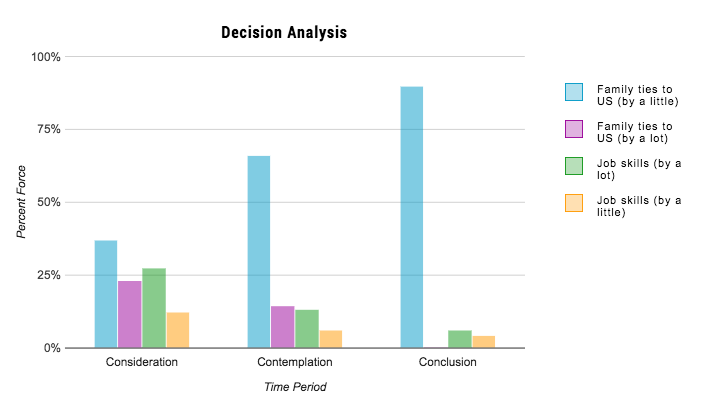Donald Trump announced his candidacy for President by promising that “nobody builds walls better than me” and has made restricting immigration – legal and illegal – a priority ever since. Two years later, the President has unveiled the specifics of a proposal to slash legal immigration nearly in half. Supporters of the President praised the fulfillment of his campaign promises, noting the bill would “protect US workers, protect US taxpayers, and protect the US economy.” But, detractors note that the proposal challenges long-held beliefs who should be allowed into America and why.
According to the New York Times, “under the current system, most legal immigrants are admitted to the United States based on family ties…” but the new bill “would institute a merit-based system… favoring applicants based on skills, education and language ability rather than relations with people already here.” That sort of drastic shift in immigration policy is bound to stir up controversy, so researchers at Unanimous AI turned to their Swarm AI platform to determine what to make of the President’s proposal.
To find out, researchers convened a swarm of thirty American voters and asked them to take a long look at the President’s immigration proposal. Swarming enables groups of average people to perform like “super-experts,” which makes it a perfect vehicle for examining the complicated topic of immigration reform. The swarm was tasked not only with forecasting the proposal’s likelihood of passing, but also asked for insight into the motivation behind the proposal and its potential impact. The first question posed to the swarm dealt directly with the proposed shift in immigration philosophy.

This all-important question deserves some further examination. Looking at the Faction Analysis provided by our Swarm Insight portal, you can see that while the swarm quickly converged on “Family Ties ( by a little )”, combining that support with “Family Ties (by a lot)” represents a clear majority of support over the options for “Job Skills.” So, while the “Job Skills ( by a little )” response did carry a quarter of the swarm’s support early on, that support vanished almost immediately. In the end, “Family Ties ( by a little ) garnered somewhere around 95% of the swarm’s optimized output.

With that sort of decisiveness on display by our Swarm AI, it is perhaps not surprising that this group of voters saw very little benefit at all to the President’s proposal. In fact, when given five potential benefits to identify as the most likely positive result of the new proposal, the Swarm AI opted for the most pessimistic sixth option available.

The Swarm AI’s response to this question’s kissing cousin, “what will be the most negative outcome?” produced an equally pessimistic response: “Destroys families / humanistic concerns.” With so much negativity surrounded the proposal, one might be tempted to wonder what chance this bill could have to pass the Senate, but staunch defenders like White House adviser Stephen Miller gave passionate defenses of the bill this week, chastising its critics at a press briefing, “Maybe it’s time that we had compassion…. for American workers. President Trump has met with American workers who have been replaced by foreign workers. Ask them how this is affecting their lives.”
The President’s proposal would require sixty votes to pass the Senate. Currently, there are 52 Republicans and 48 Democrats in the Senate. With that in mind, the Swarm AI was asked to forecast how many Senators would vote for Trump’s immigration bill. As evinced in last week’s historic health care vote, where Republicans were unable to muster even the fifty votes required for the so-called “skinny repeal,” there are no easy victories in the Senate these days, and the Swarm AI believes this bill too will fall short.

The President’s most staunch supporters back his proposed immigration reform bill wholeheartedly, but the rest of the country is proving more difficult to win over. Even Miller’s impassioned defense may have fallen on deaf ears. When asked to identify the motivation behind Trump’s proposed preferential treatment for English speakers, the swarm was quite clear in its response: xenophobia / racism.
With that sentiment and the Swarm AI’s forecast that the bill would fall nearly 18 votes shy of passing, immigration reform is shaping up as another long-shot attempt to fulfill the President’s campaign agenda. But, those who would count the bill out would do well to remember that many people counted Trump out many times during the campaign.
Please check out the chart below for the full results of the Swarm AI Guide to Immigration Reform.
Every week Unanimous A. I. brings together swarms of regular people just like you to help us predict sporting events, investment opportunities, and technology as well as provide insight into everything from pop culture to politics. If you’d like information on joining a swarm – or just want to stay up to date on the latest predictions – click the button below.


